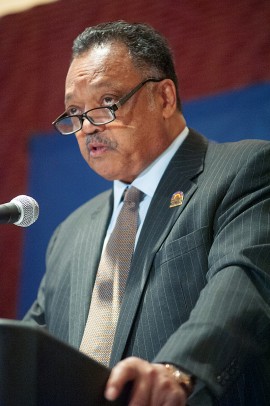‘We must break the culture of ignorance’

“You are our now,” the Rev. Jesse Jackson told the crowd Monday in Student Center East. Photo: Roberta Dupuis-Devlin/UIC Photo Services
“Strong minds break strong chains,” the Rev. Jesse Jackson told a standing-room-only UIC crowd in Student Center East Monday.
“We must break the culture of ignorance.”
Jackson spoke to an audience of more than 300 as part of the Chancellor’s Lecture and Event Series. His address — sponsored by the Social Justice Initiative, the Institute for Policy and Civic Engagement, the Great Cities Institute and the Institute for Research on Race and Public Policy — marked the 30th anniversary of his presidential bid.
His message: “Fight for an even playing field and make America a better nation.”
“It was the civil rights movement, not the government — we bled the walls down,” he said. “We changed the world because students had the will to fight back and make America better.”
Jackson recalled the march alongside Martin Luther King Jr. from Selma to Montgomery, Ala., in 1965, seeking voting rights for African Americans — a right “states should not have the power to determine,” Jackson said.
Speaking on the eve of the Illinois primaries, he urged audience members to exercise their right to vote and break down social injustice.
“Too few have too much and too many have nothing,” he said. “It’s not just about black and white, it’s about wrong and right.
“It’s empowering yourself to vote to make choices — you can’t vote, you can’t make choices. Voting should be on your agenda.”
Nearly half the audience rose when Jackson asked those with student loan debt to stand.
“I’m astonished at how many of us sit here today who want student loans reduced,” he said. “That is an issue worth voting for and fighting about tomorrow.”
Jackson talked about the growing gaps in wealth, education and opportunity throughout the city. He said Chicago is becoming three separate cities: the South and West sides, which face gun violence, job loss and foreclosure; the North Side, with growing wealth; and the suburbs, with “help wanted” signs on the doors.
“Your challenge, as a young America, is to do something different,” he said. “You learned to survive apart; you now must live together.
“You are not our future, you are our now.”
